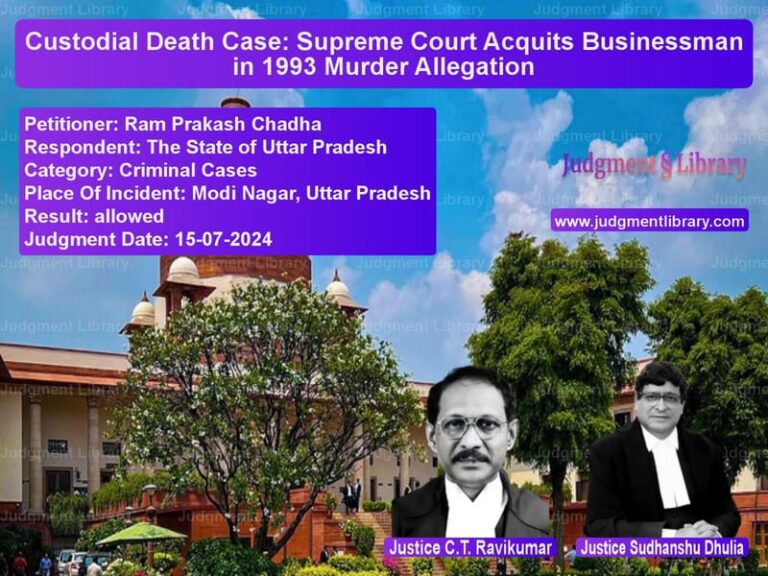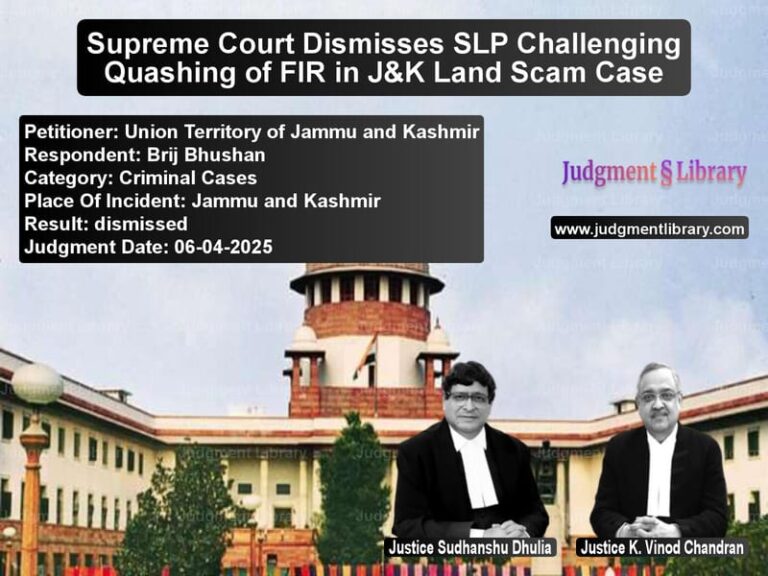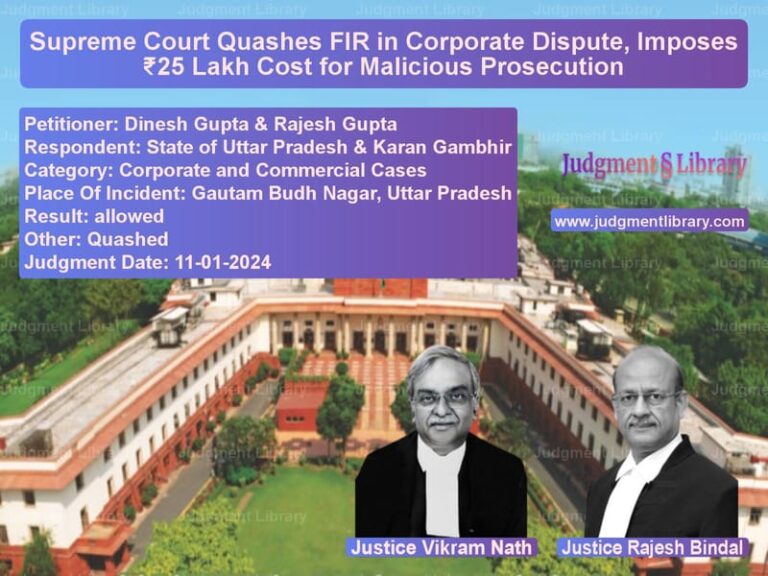Patricide and the Legal Implications: Chherturam @ Chainu vs State of Chhattisgarh
The case of Chherturam @ Chainu vs State of Chhattisgarh presents a complex scenario of patricide, where the appellant, under the influence of alcohol, killed his father during a heated argument. The Supreme Court was tasked with deciding whether the crime constituted murder under Section 302 of the Indian Penal Code (IPC) or whether it fell under the exception for culpable homicide not amounting to murder as per Section 304 Part I of the IPC. The judgment focuses on the nature of the crime, the influence of alcohol, and the brutal manner in which the crime was committed.
Background of the Case
The incident occurred on the night of 26th and 27th July 2010, when Chherturam (the appellant) and his father, Goienda, were drinking together. An argument ensued, leading to a violent altercation. The appellant assaulted his father with a Nagar Wood, resulting in the father’s death. The altercation, fueled by alcohol, was witnessed by a neighbor, Chamruram (PW-8), who reported the incident to the police. The appellant admitted to killing his father in the presence of his brother (PW-4). An FIR was lodged, and the appellant was arrested on 28th July 2010. The investigation revealed that the injuries inflicted were fatal, leading to a charge of murder under Section 302 of the IPC.
The Prosecution’s Case
The prosecution presented a strong case based on direct evidence, judicial confession, and circumstantial evidence. According to the autopsy report, the deceased had suffered eleven fatal injuries, including blunt force trauma to the head, chest, and abdomen. The injuries were consistent with being caused by a hard, blunt object, and the cause of death was determined to be hemorrhagic shock resulting from these injuries. The prosecution argued that the nature of the injuries indicated that the appellant had the intention to cause death or serious bodily harm, qualifying the act as murder under Section 302 of the IPC.
Read also: https://judgmentlibrary.com/juvenility-in-criminal-cases-a-legal-battle-for-justice/
The trial court, after considering the evidence, convicted the appellant under Section 302 of the IPC for murder. The court noted the brutality of the attack and the fact that the appellant had inflicted multiple injuries on vital parts of the body, including the head, chest, and abdomen. The court sentenced the appellant to life imprisonment with a fine of Rs. 1,000, and in default, an additional four months of rigorous imprisonment.
The Appellant’s Defense
The appellant, in his defense, pleaded innocence and claimed that the crime was not premeditated. He argued that both he and his father were intoxicated at the time of the incident, and the altercation occurred in a fit of rage without any prior intent to kill. He contended that the case should fall under Section 304 Part I of the IPC, which deals with culpable homicide not amounting to murder, rather than Section 302 for murder. The appellant sought to argue that the killing was not premeditated and was the result of a sudden quarrel under the influence of alcohol, which he believed should mitigate the offense.
The Respondent’s Arguments
The respondent, the State of Chhattisgarh, countered the appellant’s argument by emphasizing that the nature of the injuries was severe and that the act of inflicting multiple injuries on vital organs demonstrated cruelty and intent. The respondent referred to Exception 4 of Section 300 of the IPC, which could potentially reduce the charge to culpable homicide not amounting to murder if the act was committed in a sudden fight without premeditation. However, the respondent argued that the injuries were inflicted in a brutal manner, which negated the possibility of the offense falling under Exception 4. Furthermore, the respondent cited Section 86 of the IPC, which holds that intoxication does not absolve a person of criminal responsibility if they had the necessary intent or knowledge to commit the act while intoxicated.
The Court’s Analysis
The Supreme Court carefully examined the facts of the case and the legal provisions, particularly Section 302 of the IPC, which defines murder, and Exception 4 to Section 300, which provides an exception for culpable homicide not amounting to murder in cases of sudden quarrels. The Court noted that the incident occurred in the context of a heated argument between the appellant and his father while they were both intoxicated. The Court recognized that alcohol may have played a role in the escalation of the argument but stressed that this did not justify the brutal nature of the attack.
The Court observed that there was no premeditation in the crime, and it occurred during a sudden quarrel. However, the Court also noted the sheer number and severity of the injuries inflicted on the deceased. The appellant had struck his father multiple times with a Nagar Wood, focusing on vital areas like the head, chest, and abdomen. The injuries were not consistent with a simple altercation but with a merciless and brutal attack aimed at causing severe harm or death.
The Court held that the crime could not be classified under Exception 4 of Section 300, which requires that the offense be committed in a sudden fight without cruelty or brutality. The nature of the injuries and the fact that the appellant had inflicted them on vital areas of the body indicated that the act was carried out with the intention of causing death or serious harm, which warranted a conviction under Section 302 of the IPC for murder.
Final Judgment
The Supreme Court upheld the conviction of the appellant under Section 302 of the IPC for murder. The Court rejected the appellant’s plea for a reduction of charges to culpable homicide not amounting to murder under Section 304 Part I, noting the brutal nature of the attack and the fact that the appellant had inflicted multiple fatal injuries on his father. The Court further emphasized that the appellant’s defense of intoxication did not absolve him of criminal responsibility under Section 86 of the IPC, as he had acted with the requisite knowledge and intent while intoxicated.
However, the Court also took into account the fact that the appellant had already served twelve years of imprisonment. The Court directed that the State consider the appellant’s case for remission under the applicable remission policy after the completion of the mandatory sentence.
Significance of the Judgment
This judgment is significant in clarifying the application of Section 302 of the IPC in cases where the offense is committed in a sudden quarrel, particularly in the context of intoxication. The Court reaffirmed that even in cases where the offense is not premeditated, the brutality and the nature of the injuries can determine whether the charge qualifies as murder. The judgment also highlights the importance of considering the principles of law surrounding intoxication, as provided under Section 86 of the IPC, which holds that intoxication does not absolve a person from criminal responsibility if they have the intent or knowledge to commit the crime.
The ruling also underscores the importance of assessing the nature and extent of injuries in determining the intent behind the crime. In cases of violent patricide, the Court’s focus on the brutality of the act over the influence of alcohol sets a precedent for future cases involving similar circumstances.
Petitioner Name: Chherturam @ Chainu.Respondent Name: State of Chhattisgarh.Judgment By: Justice Sanjay Kishan Kaul, Justice Pamidighantam Sri Narasimha.Place Of Incident: Chhattisgarh, India.Judgment Date: 13-09-2022.
Don’t miss out on the full details! Download the complete judgment in PDF format below and gain valuable insights instantly!
Download Judgment: chherturam-@-chainu-vs-state-of-chhattisgar-supreme-court-of-india-judgment-dated-13-09-2022.pdf
Directly Download Judgment: Directly download this Judgment
See all petitions in Murder Cases
See all petitions in Bail and Anticipatory Bail
See all petitions in Judgment by Sanjay Kishan Kaul
See all petitions in Judgment by P.S. Narasimha
See all petitions in dismissed
See all petitions in supreme court of India judgments September 2022
See all petitions in 2022 judgments
See all posts in Criminal Cases Category
See all allowed petitions in Criminal Cases Category
See all Dismissed petitions in Criminal Cases Category
See all partially allowed petitions in Criminal Cases Category







